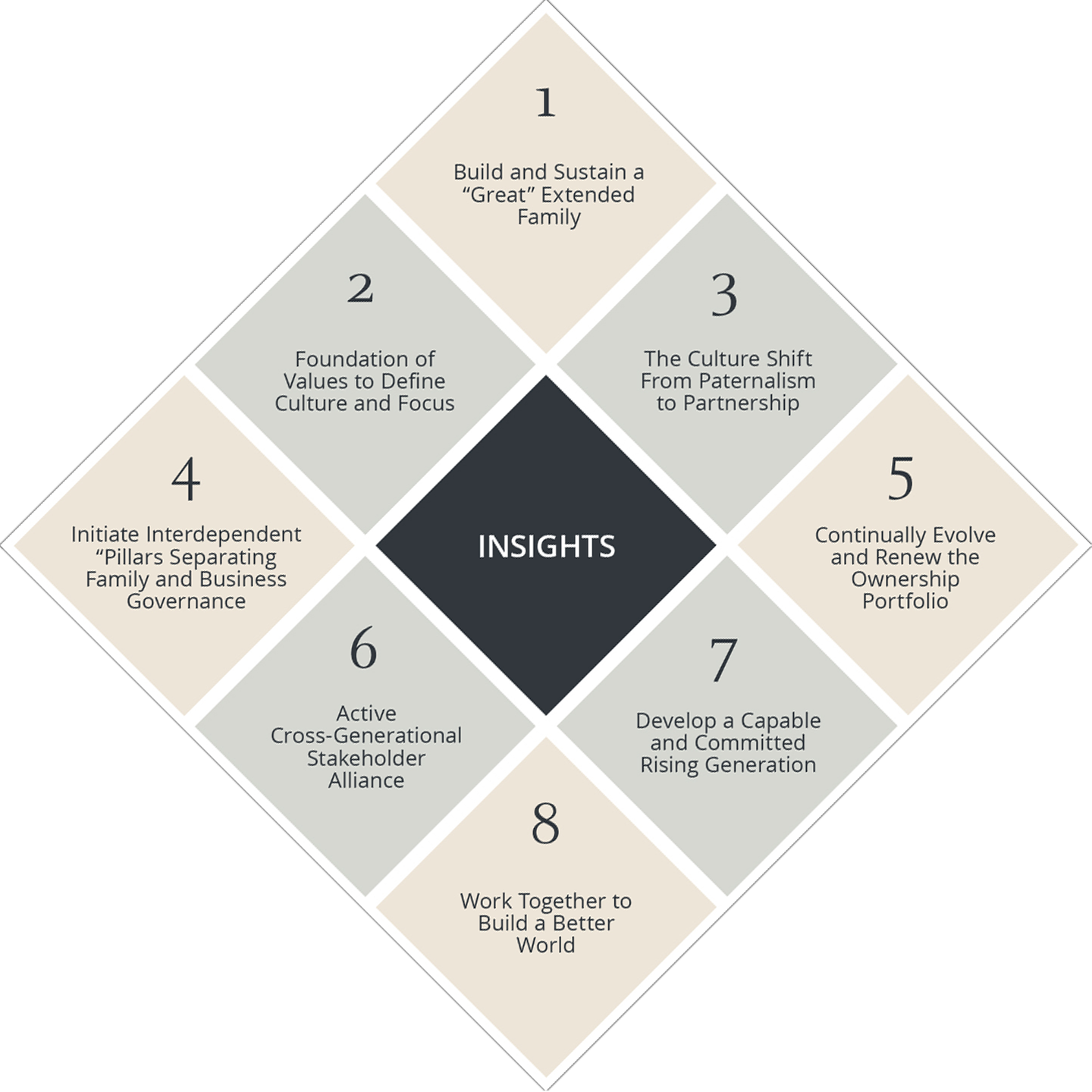A great business family’s main “product” is its rising generation. The family wants to see their children become capable, responsible individuals who care about each other, share family values and are ready to take on stewardship of family enterprises. The elder family members can’t ensure that every heir will turn out as they’d wish, but they nonetheless invest in activities that make this outcome likely – as demonstrated by these two accounts:
People don’t understand the importance of education and underestimate the time, care and devotion it takes to build a strong family. Our family business is a combination of individuation and collectivism.
The important matters include what we expect heirs to do, values for parents to instill in their kids and access to foundation programs. We have community projects, sending some kids to do hospital work or Habitat for Humanity, to give them a taste of the business stuff we think is important.
The families in our study identified values and qualities they encourage in their children.
- Generosity: Give back to the community
- Respect: Value people of all wealth backgrounds
- Work ethic and skills: Have the capability to earn their own money and find work at which they can succeed
- Self-esteem: Find value in themselves independent of their wealth
- Financial literacy: Handle money wisely
- Responsibility for wealth: Do not become spoiled by affluence; instead, understand that wealth is a tool, not an end in itself
- Frugality: Apply prudence in spending
- Appreciation: Value the opportunity wealth offers
In most families, instilling such values is the task of the individual household. But these long-term family enterprises, because of their complexity and the demands of their ventures, require this task to be shared by the extended family tribe.
Generative families develop the capability and commitment of the rising generation through a variety of active methods of engagement and learning, as these two families report:
We identify and support upcoming talent, identifying people who have an interest in learning about the business even if it is just on a family-ownership level or if it’s somebody who thinks to themselves, “I might want to work at the company.” How do we go about fostering that? One of the ways is getting them involved with the family council, then trying to have them learn about the business and see if it’s something they might want to do later in life. The family council meets four times a year directly after the board meeting.
Having a family that’s committed to family education is essential. There needs to be a driver within the family pushing it. In the early days, we held workshops on understanding personality types, communication skills and finances. Utilizing an outside source to provide some programming makes a huge difference because if you’re trying to develop these things on a one-off basis, it’s incredibly time-consuming. Years ago, we developed a longer-term curriculum of what we cared about having our kids learn. Then we looked at the components and identified the things we thought made sense for the kids to learn together in a common space or place. We then identified the things that we felt were better taught and learned within the branches of the family.
Generative families also develop educational and skill development programs for the rising generation. These go beyond information sharing to develop the new generation’s capability to take on leadership in the family enterprise. They teach relationship, financial and business skills – skills they wouldn’t necessarily learn in higher education.
Family business education is not simply “delivered” to the youngsters, it combines active engagement from them and leadership from the elders. These programs can be similar to experiential corporate training. Like executives, the young members learn to work effectively as a team, overcoming (sibling) rivalry and removing conflict from the family:
We have done age-appropriate work with the younger generation, including self-development, leadership, understanding self and basic entrepreneurial practices. We review every acquisition we’ve conducted and review our financials twice a year with them. They’ve gone through our tax returns in detail and been to such things as product launches, grand openings and site expansions. If they want to have a car when they turn 16, they have to make $5,000 on their own by, say, lifeguarding or cutting grass. We’ve also designed a summer experience for teenagers where they spend time in finance, IT, strategic planning, human resources and small-business initiatives.
Mentoring is the pairing of a young family member with a trusted senior person who helps them develop skills to work in the family business, and to whom they can confidentially open up about their anxieties. The mentor can be another family member, an independent board member or nonfamily executive, as this family council leader reports on fourth-generation (G4) members:
Our G4 are juniors or seniors in high school, ready for summer jobs and internships. We create opportunities for them to work in the business at age 15. We also focus on educating our G4s about the business, what they’re a part of and what they’ve been born into, along with talking about wealth and stewardship.
Mentoring and career development serve a dual purpose for qualified family members, helping them prepare for their career of choice and/or part-time governance roles. Being part of these efforts offers the rising generation visible opportunities to add to the family’s social and business mission and demonstrate their leadership abilities.
The family encourages young members to develop on their own, apart from the family enterprise. They want them to develop skills and experience the family does not have by living and working in ventures that can add to the family’s capital. After developing skills and credibility by working outside the family, members gradually bring what they have learned back to the family by becoming involved in governance activities.
The generative families invest time, energy and resources in engaging and developing their new generation. By teaching values and developing skills, the family expects to overcome the threat of having unproductive or entitled heirs. The family invests in their children, and teaches their values and mission, to sustain the family enterprise.
Below are the main takeaways in successfully raising the next generation seen across the generative families in the study.
Develop a family education program
Families regard transparency as a core value. But giving information to young people who do not understand it makes no sense. A large and complex family enterprise finds that what family members need to learn is not taught in school, even in business school. They create customized seminars and learning activities for young people, which enable them to do something together while learning about the business and family enterprises. They are also a vehicle for teaching family values about business and money. These learning programs often take place at family assemblies, but also increasingly can be online or in special sessions, perhaps guided by business and financial advisors. Regular briefings on business activities, major projects or new investments can get young people excited and help them realize that this is their family doing wonderful things.
Offer opportunities for active learning and involvement in the businesses
As young people grow up, they become increasingly curious about what the family does. A business or family office can be mysterious, and inviting young people to visit, be briefed or work in an internship or summer job can bring what the family does to life. They also help connect young people to what the business leaders do and what they care about. The generative family should find ways to invite young family members to learn about what they do – in their businesses, family office and philanthropic activities – actively and directly. Many families offer a summer internship that can become an important event when young people look ahead to what they want to do in their lives.
Support career planning, mentoring and personal development of the rising generation
Generative families are not just looking for a single person or people who want to make the family business their career. Their next generation are the “product” of the family, and the family wants its resources to help each individual become the best and most capable person they can be. Each young family member can be encouraged and helped to form and continually update a personal career development plan. Families want to invest in their rising generation. Generative business families offer resources to young people and encourage them to use them. They offer coaching and mentoring to learn their capabilities and discover what they might do. They sometimes offer capability assessment and career planning.
They want each young person to find a path to be responsible, capable and excited about what they do in the world. They can use their resources to encourage them to plan and make good choices.
Create a talent map and qualifications for family roles and responsibilities
The generative family looks to the future, to sustain and build upon past achievements to create future value. The family needs young family members to eventually take on many responsible roles contributing to the family. These are often not full-time jobs; rather, they are roles that take some time in an otherwise busy life. In order to encourage and prepare their rising generation for these roles, a family can create a “talent map” of the possible roles – board and committee memberships, projects and service roles – and define clearly what capabilities they require. Knowing this, young people who want, say, to be considered as a member of the investment committee, or as a board member for their philanthropic foundation, can make their interest known and undertake preparing themselves for this role. Having this map encourages young people to step up by showing them that a role is not an entitlement, but a responsibility and an opportunity to serve and give to the family.











